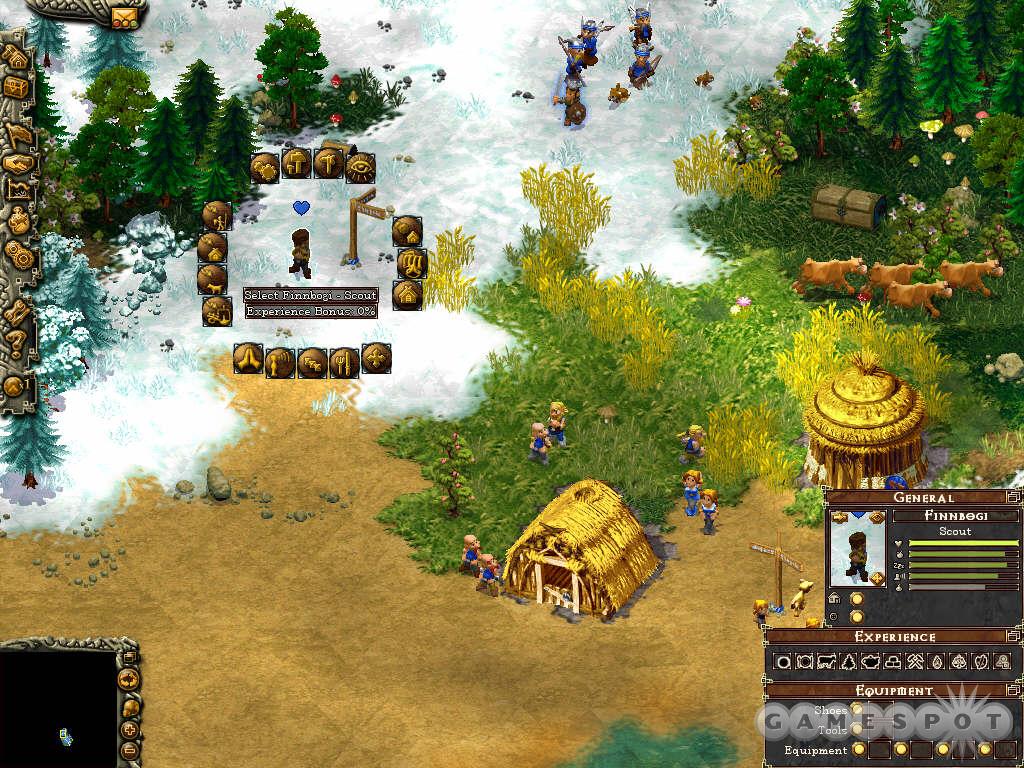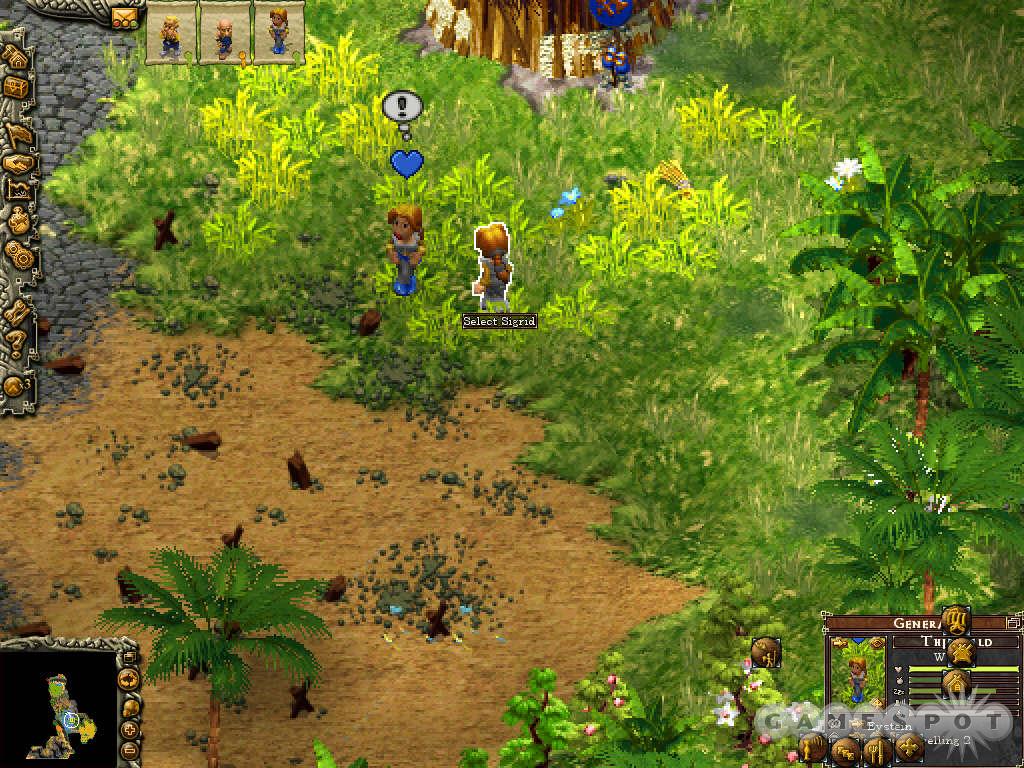Northland, the third game in the Cultures real-time strategy series, has finally been released in North America, after shipping last summer in Europe. The game offers a lot of content and is sure to keep hardcore Cultures fans busy for quite a while. However, those who are new to the series may not get past Northland's dated graphics engine or game design, which hasn't evolved with the rest of the RTS genre. A showstopping technical glitch that affects ATI cards may keep some players from even loading the game at all.

Northland follows the story of a wandering band of Vikings, led by a quartet of heroes named Bjarni (son of the famous explorer Leif Ericsson), his lover Cyra, and their friends Hachi and Sigurd. After saving the world in Cultures 2, Hachi and Sigurd have returned to their homelands, but Hachi soon finds that his homeland is overrun by enemies. As a result, he calls upon his friends for help. The game's campaign is spread out over eight missions, and you can also play an additional eight stand-alone missions that are unrelated to the story. A handful of multiplayer levels are also included, but there's no true matchmaking service available, and the LAN games we attempted were unstable.
Speaking of bugs... When we first got our Northland disc, we were unable to load the game properly. Launching the game would allow us to view the opening cinematic, and then we were dumped to a black screen that presented us with just a cursor. Unfortunately, there's currently no patch for the game, nor is there any troubleshooting information. After combing through the game forums, we learned that this issue seems to afflict all recent ATI Radeon cards, including the 9500, 9600, 9700, and 9800 series. With some more research, we finally discovered a work-around to the problem on an ATI-enthusiast site. Only by going into our video card properties and disabling DirectDraw and Direct3D acceleration were we able to play Northland.
Once in the game, Cultures veterans will find that not a whole lot looks different in Northland from Cultures 2. The graphics and interface are just about identical, so longtime fans will feel right at home. Those who are new to the series, however, may feel intimidated at the outset by the seemingly dozens of buttons and info boxes that pop up anytime you click on something. Thankfully, a useful set of tutorial missions is included to help ease players into Northland's interface.
Northland uses the same 2D, isometric graphics engine as 2002's Cultures 2. The characters in the game are cartoony; the landscape includes a lot of greenery and animals; and everything looks cheery and colorful, with a vibrant palette. While the visuals have some charm in an artistic sense, on a technical level, Northland's graphics fall short of most modern RTS games. Structures look blocky, and you can easily lose track of your characters behind buildings or in dense forests because these don't seem to become transparent when characters move behind them.
As far as the gameplay is concerned, Northland can be summed up in one word: tedious. The game seems to be something of a fusion between a city-building game, a standard RTS, and a life simulation, like The Sims. In most scenarios, you'll start from scratch with a band of Vikings. Your goal is to try to establish a settlement that includes a headquarters (or city center), farms, houses, barracks, and special-crafts buildings, like stonemason shops, mills, bakeries, and smiths. The problem with the game is that it forces you to perform so many mundane tasks to accomplish things that most RTS players take for granted.
For example, one of the first things you'll want to do is create a farm. To do this, you'll need a supply of clay and wood. This means that you'll need to take one of your Vikings, change his job to clay extractor, and then send him off to harvest clay. You'll need to make another Viking a woodcutter so that he can go off to find wood in a forest. However, the resources these Vikings harvest aren't immediately usable. For your builders (yes, that's another profession) to gain access to them, you'll first need to assign a carrier to ferry the materials from the collection sites to your headquarters or warehouse. Finally, when these resources have been properly stored, you can have your builders construct a farm. Of course, that farm needs a farmer to tend to it--and the farm needs yet another carrier to move the wheat from the field to the headquarters. Want to make bread? Well, you'd better wait for your farmer to earn enough skill to become a miller (and don't forget to build a mill) so that he can make flour. Only after working as a miller can your farmer finally become a baker so that he can work in a bakery. As you advance a character from one profession to another, you'll need to remember to have another idle Viking fill in the lower-level role. From this example, you can imagine the Herculean task involved with producing something really "complicated," like a weapon, potion, or protective amulet for a soldier.
Each of your characters has a name, and there are both male and females living in the village. Only the males can hold professions though; the females only exist to marry one of the males to provide him with children and cooked food. Seriously. This is the only manner in which you can increase your population, and like everything else in Northland, it's a slow process from conception to birth to child-rearing to productive adult Viking.
Sims-like elements come into play in that every one of your villagers has needs with regard to hunger, sleep, and socialization. Thankfully, much of this is done automatically by the AI, but you still have to deal with the effects of it in the form of inefficient workers. If your workers are hungry, they will automatically stop what they're doing to go find something to eat. If they have wives who cook for them, their hunger motives don't drain as quickly, and thus, they become more efficient. Your Vikings will also sleep when the need arises. If they're homeless, they'll just curl up on the ground and will then doze off, but this sleep isn't as restful as if it was induced in a house, so you must make sure to provide homes for all of your characters. Vikings also need to socialize, so don't be surprised if you see your villagers goofing off and chatting it up instead of working.

Once you have all of these domestic issues sorted out, you'll still need to keep track of the world around you by exploring, trading with or attacking other villages, and defending your own village from attack. You'll run into non-player characters on the maps, and you can pick up treasure you find lying around in chests, but chances are you'll be so caught up in the establishment and running of your town that you won't get to the fun stuff for quite a while.
Overall, Northland falls short of delivering a satisfying experience. It's difficult to care about the story or any of the characters in it when the game doesn't have any voice acting to lend personality to it. Furthermore, it's tough to slog through all the minutiae the game throws at you. The tedious busywork will be particularly irritating to anyone familiar with more-recent RTS games that bend over backward to streamline mundane aspects of gameplay to focus on what's most important. If that isn't reason enough to avoid Northland, ATI card users have to deal with figuring out a work-around just to load the game. While hardcore Cultures fans and those who enjoy micromanagement may find something to like in Northland, anyone else--especially people with short attention spans--should look elsewhere.